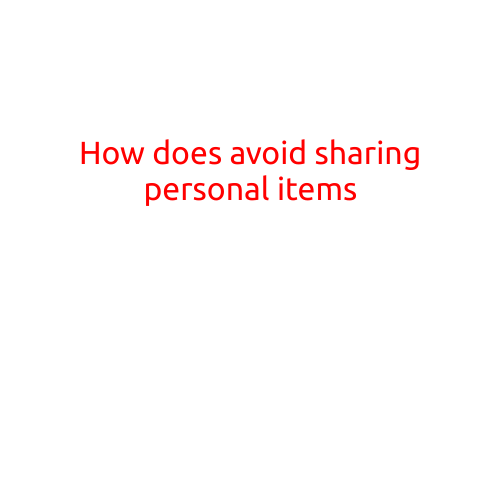
How to Avoid Sharing Personal Items
Sharing is caring, or so the saying goes. However, when it comes to personal items, many of us want to draw a line between what we’re willing to share and what we’re not. Whether it’s due to sentimental value, hygiene concerns, or simply a desire for personal space, there are many good reasons why you might not want to share certain items with others. In this article, we’ll explore some practical tips on how to avoid sharing personal items without being rude or offending others.
Set Boundaries
The first step in avoiding sharing personal items is to set clear boundaries with others. This means being upfront and honest about what you’re willing and not willing to share. If someone asks to borrow a particular item, don’t feel pressured to say yes just to avoid hurt feelings or to avoid being seen as selfish.
Instead, try saying something like, “I appreciate the offer, but I’d prefer not to share that particular item. Would you be willing to lend me something else instead?” or “I’m really particular about that item and would rather keep it to myself. Maybe we can find an alternative solution?”
Communicate Your Needs
Sometimes, people may not realize that certain items are off-limits simply because they don’t know any better. By communicating your needs clearly, you can avoid misunderstandings and miscommunications.
For example, if you have a favorite pair of shoes that you like to wear on special occasions, you might say, “Hey, I love these shoes, and I wear them for special occasions. Would you mind not borrowing them without asking me first?” or “I have a few pieces of jewelry that are really sentimental to me. Would you be okay with not borrowing them or touching them without permission?”
Use Physical Barriers
Another way to keep personal items safe from being misplaced, lost, or damaged is to use physical barriers. This can be as simple as locking away certain items in a cabinet or drawer, or designating a specific area as off-limits.
For instance, if you have a collection of rare books or documents, you might store them in a secure cabinet or on a high shelf to prevent accidental damage. Similarly, if you have a favorite piece of artwork or a sentimental keepsake, you might keep it in a secure location or display it in a way that makes it difficult for others to touch or move.
Practice Self-Care
Lastly, remember that setting boundaries and avoiding sharing personal items is not selfish. In fact, taking care of your own emotional and physical well-being is essential to maintaining healthy relationships and a sense of personal space.
By prioritizing your own needs and desires, you’re not only protecting your personal items, but also setting a positive example for others to do the same. Remember, it’s okay to say no to requests that make you uncomfortable or that compromise your personal space.
Conclusion
Avoiding sharing personal items doesn’t have to be a difficult or awkward conversation. By setting clear boundaries, communicating your needs, using physical barriers, and practicing self-care, you can maintain your personal space and keep your treasured items safe from harm. Remember, prioritizing your own needs is not selfish – it’s essential to living a happy, healthy, and fulfilling life.





